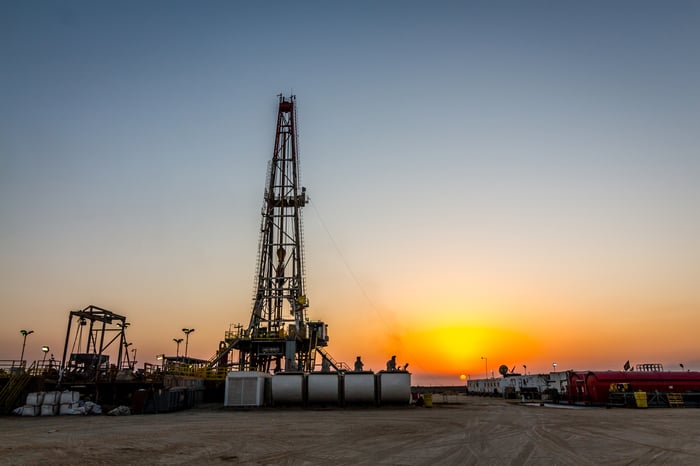Oil giant BP (BP -1.17%) won the bidding for BHP Billiton's (BHP -0.72%) (BBL) U.S. shale assets, agreeing to pay $10.5 billion in cash for a position in the highly prized Permian Basin as well as assets in the Eagle Ford and Haynesville shale plays. It's a bold move for BP -- and its biggest transaction since 1999 -- as it will transform the company's U.S. shale business while enhancing its ability to grow production and cash flow in the coming years.
Details on the deal
BP will pay $10.5 billion in cash for most of BHP Billiton's shale assets, with half of the proceeds due at closing; the remaining balance is payable in six equal installments over a six-month period starting one month after the close, which the companies anticipate will occur by the end of October. BP is acquiring "world-class" unconventional oil and gas assets from BHP, in a move that "upgrades and repositions" its U.S. onshore business.
BP will pick up land in the "highly prized" Delaware Basin side of the Permian, which currently consists of 83,000 acres that hold 3,400 future drilling sites and produce about 40,000 barrels of oil equivalent per day (BOE/D). In addition, the company will get a premium position in the Eagle Ford shale, which currently consists of 194,000 acres that hold 1,400 future drilling sites and produce about 90,000 BOE/D. Finally, BP will receive 194,000 acres in the gas-rich Haynesville shale, where output averages about 60,000 BOE/D and 720 drilling locations remain.

Image source: Getty Images.
Meanwhile, in a separate deal, BHP Billiton agreed to sell its assets in the Fayetteville shale in Arkansas to another company for $300 million. With that transaction, BHP will completely exit the U.S. shale sector.
What it means for BP
This transaction is a needle-mover for BP in both the short and long terms. It will immediately add 190,000 BOE/D of production, bolstering its position in the U.S. that already consisted of assets in the Eagle Ford and Haynesville shales. Meanwhile, it will immediately be accretive to both earnings and cash flow.
In addition, the transaction materially improves BP's business outlook through 2021. While the company still plans to invest $13 billion to $14 billion per year in capital over that time frame, it can now grow production at a 5% compound annual growth rate even though it plans to sell $5 billion to $6 billion in assets to help fund this deal. Further, it sees the transaction adding $1 billion to its free cash flow forecast for 2021, increasing that year's target to between $14 billion and $15 billion, assuming $55 oil.
In addition to enhancing BP's long-term plan, CFO Brian Gilvary stated that "the acquisition also creates the potential for significant value creation over and above the purchase price." That's because the company believes it can capture $350 million in annual expense synergies by combining these assets with its own U.S. shale position. On top of that, the company sees upside as it becomes more efficient, as well as the potential to discover new resources on the acreage as it continues exploring. Meanwhile, there's further upside potential from higher oil prices, since the company based the deal on oil averaging $55 a barrel.

Image source: Getty Images.
What it means for BHP Billiton
For BHP Billiton, this transaction marks its exit from shale, which has been a money-losing proposition for the global resources giant. The company initially paid about $20 billion to build its shale position in 2011, which included forking over $4.75 billion for the Fayetteville assets and spending $15.1 billion for Petrohawk Energy and its positions in the Permian, Eagle Ford, and Haynesville. However, the $10.8 billion exit value is much better than analysts anticipated: Most thought it would only fetch about $9 billion for these assets.
BHP plans to return all the cash to investors since its net debt is currently toward the lower end of its $10 billion to $15 billion target range, though it has yet to confirm how, or when, it will send that money to investors. It could conduct a stock buyback program, pay a special dividend, or choose some combination of those options.
A win-win for both companies
While BP is undertaking its largest transaction in nearly two decades, the acquisition makes a lot of sense: It's a good strategic fit for the company, and will enhance its long-term value proposition. Meanwhile, BHP Billiton received solid value for those assets, giving it a boatload of cash to return to investors. It's a transaction where both companies came out winners, though BP could end up coming out ahead in the long run if oil prices continue rising.



